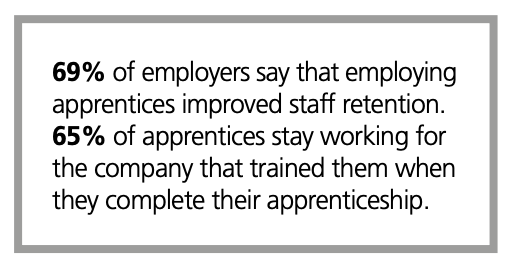Co-authored by Jon Jackson and Rebecca Richens
Why do apprentices need career guidance?
- Their apprenticeship may not end up in a permanent position. They need to know their options
- They may not be aware of the opportunities for progression within their current organisation
- They may not be enjoying the apprenticeship role as much as they thought they would
How are apprenticeship providers involved?
Apprenticeships are not simply training programmes, they are meant to be personal development programmes.
Apprenticeship providers should work with employers to nurture their apprentices and help them grow as individuals.
There is explicit regulatory guidance around careers guidance for schools and colleges but this does not necessarily apply to all apprenticeship providers, particularly if their learners are over 18 years of age.
But what does Ofsted have to say about careers advice and guidance as part of an apprenticeship?
Here are some excerpts taken from recent Ofsted reports which highlight the importance of embedding careers guidance into apprenticeship programmes:
- Leaders and managers do not ensure that apprentices receive appropriate careers advice and guidance to support them in their next steps. As a result, apprentices do not have a clear understanding of their progression and career opportunities beyond the programme they complete.
- Leaders must ensure that apprentices receive impartial careers advice and guidance during their apprenticeship programme, so that they understand the broad ranges of opportunities available to them when they complete their apprenticeship.
A university with all 19+ learners was given the following feedback:
- Not all apprentices understand the different career opportunities available to them outside their current employer.
- Teachers do not consistently promote career opportunities for apprentices. Apprentices have access to a central careers service, a careers website, and an employment agency. However, it is not clear how often they use this service.
- Leaders need to make sure that apprentices recognise and understand the career opportunities available to them outside of their current employer.
How can apprenticeship providers effectively embed careers advice?
Whilst all careers guidance should be tailored to the needs of the apprentice there is some fundamental information that can be provided as a basis for individual discussion.
Career guidance is often left to the end of the apprenticeship but it can also be considered as part of the onboarding process to ensure that the apprentice is on the right apprenticeship at the right time.
At the end of the apprenticeship, whether at conclusion or early exit, the information, advice and guidance should support them in their next steps.
The apprenticeship provider can curate this information to provide apprentices with an overview of the opportunities, the different sectors and levels available. This can be provided within a separate career guidance training unit or embedded within other units.
Content could include:
- How to develop a career plan
- How to write a CV
- Interview preparation guidance
The most inclusive apprenticeships will also include information on benefits and welfare support as it is acknowledged that financial hardship can be a factor in whether to continue an apprenticeship and a consideration when making future career choices.
Apprenticeship and employability providers offer both standardised and bespoke career guidance units.
Useful online careers information, advice and guidance can also be found from various sources such as:
- Institute of Apprenticeship Occupational Maps
- UCAS information on apprenticeships, careers and university
- National Career Service
- LinkedIn career guidance
Staff retention and building apprentice loyalty
Many employers are apprehensive about offering career guidance near the end of the apprenticeship as they fear this will encourage the apprentice to seek opportunities in other companies. Loyalty research shows that employers find apprentices make the most loyal employees. Employers can also strengthen this loyalty by helping them develop a career path within the company.

How can apprenticeship providers support the employer in developing a career plan
The apprentice career plan will generally be contained in the apprenticeship review process. Agreement can be made between employer and apprenticeship provider to develop a career plan as part of an apprentice’s portfolio.
Evidence can be captured in the portfolio in a variety of ways such as:
- Projects e.g. to research career progression within the company related to the areas of study
- Reflective tasks after career guidance
- Structured mentoring sessions with others in the company that focus on career progression opportunities
By building strong relationships within the company, focussing on celebrating the apprentice’s success throughout the apprenticeship and building a progression pathway during and beyond the end of the apprenticeship, employers significantly decrease the likelihood of losing the apprentice at the end of their apprenticeship training programme.
We’d love to hear from you
If you have any ideas or best practice to share, we’d love to hear from you.

